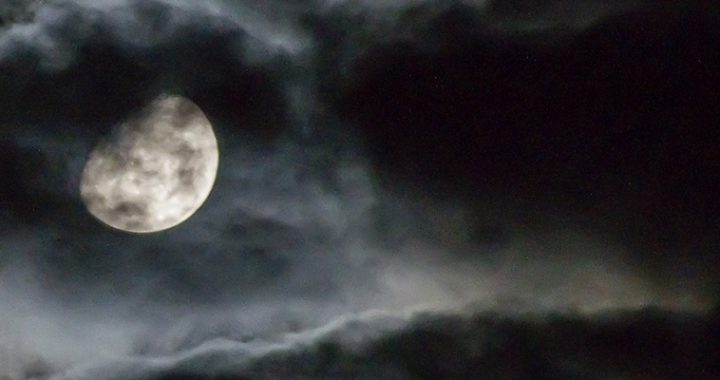September 27, 2020
At three o’clock Jesus cried out with a loud voice, “My God, my God, why have you forsaken me?” ~ Mark 15:34
Last Tuesday night, I went upstairs to sleep. Sleepless nights seem more common than restful nights lately. It is never one thing that wakes me up in the middle of the night. Sometimes it’s a contentious email. Sometimes it is a family matter. The complications surrounding sanctuary always seem to wake me up. I wake up over the possibilities of post-election violence erupting in our streets. Will our country survive? The feeling is hard to describe when I lie awake at night in a stew. I think I feel like a ship without an anchor being tossed about the sea; I just cannot settle. I pray, “God give me your peace.” Unlike Jesus who calms the storm though, I continue to toss and turn, toss and turn, all night long. When the tempest comes in the middle of the night, the nights are long and dark.
Many of us have dark nights which can turn into dark seasons in our lives. Our dark nights or dark times can take on many shapes and forms. It can be a great sadness, a broken dream, internal or external conflict, or the death of a belief or idea. Quite often our faith crumbles during the dark night. Barbara Brown Taylor says regardless of how we describe our dark nights, they all have similar characteristics. Our souls, our faith, and everything we have known is severely tested and quite often shattered. “No one chooses the dark night; the dark night descends,” says Taylor.
The dark night always comes uninvited into our lives and it seems to leave when it is ready. Maybe like you, I have a bag of tricks that I try to make it leave. I pray a lot during the night; I am especially fond of the Lord’s Prayer and the Prayer of St. Francis of Assisi. “Lord, make me an instrument of they peace; where there is hatred, let me sow love, where there is injury pardon…” The prayer keeps my mind off my fear and anxiety but the minute I stop, the dark night returns. Maybe this is why Paul said to pray without ceasing.
I also read many good books but if the night is particularly dark; I have a hard time concentrating enough to read. So usually I just sit or lay in the darkness and pray for the night to end. Taylor says, “For good or ill, no one can do the work for us while we are in this dark place. It has our name all over it, and the only way out is through.” That’s a bummer but it’s good to know that we do go through the dark night of the soul and we don’t have to set up permanent residence.
We love the imagery of Psalm 23. “The Lord makes me lie down in green pastures; he leads me beside still waters; he restores my soul.” These sacred words have brought peace and comfort to people through the ages. Then the Psalmist says, “Even though I walk through the darkest valley, I fear no evil.”
The dark nights can seem like an eternity but maybe faith is trusting that we do go through the dark valleys and the sun will come up tomorrow. Usually we think about the dark night of the soul as pertaining to one person at a time, but “there are certainly times when whole communities of people lose sight of the sun in ways that unnerve them,” writes Barbara Taylor.
I wonder, usually in the middle of the night, “Are we, as a nation, collectively experiencing a dark night of the soul?” Over 200,000 people have died from the pandemic and the end does not seem in sight. Racial division seems greater than ever. Last week, Ro and I drove to Natural Bridges and on the way, we saw three houses flying the U.S. flag alongside the Confederate flag. It was deeply troubling. Our institutions, including the United Methodist Church, are under siege.
The night seems pretty dark, so what is the Good News?
Barbara Brown Taylor, Diana Butler Bass, Richard Rohr, and other theologians I respect all say the same thing in their own way. “The old ways of being are not working any more, not even for those who are old themselves. Something in the old ways of thinking and living is dying and yet at the same time something is being born,” writes Taylor.
Karen Armstrong says that we are living through a time of global transformation. Phyllis Tickle in reference to the Christian church says that “we are in the midst of a great rummage sale that the Christian church holds from time to time.” What stays and what goes? How do we do church?
In the dark night when the waves are crashing inside and outside of us, we may feel alone, abandoned, and even hopeless. We might say as Jesus did on the cross, “My God, my God, why have you forsaken me?” But as Father Richard Rohr says we can trust that divine love is holding us. For as people of faith “we know the end of the story from the beginning, that after death comes resurrection, after injustice comes liberation, and after wounding comes healing.” The sun bursts forth from the darkest night but “we can’t skip over the darkness,” writes Rohr.
May we trust that God works for good in all things.
Blessings and peace,
Craig
Note on darkness: Darkness has many nuances like everything. I fully agree with Barbara Taylor when she says that for some of us when the darkness descends, it means it is time to see a good doctor who can help right the mysterious chemistry in the brain. Let’s get professional help when we need it.

